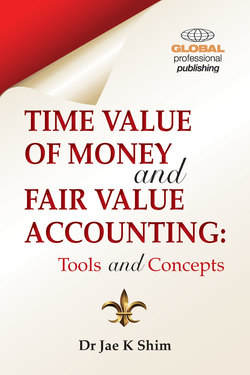Читать книгу Time Value of Money and Fair Value Accounting - Dr Jae K Shim - Страница 5
ОглавлениеContents
Chapter 1 Time value of money and its applications
The Difference between the Principal Market and the Most Advantageous Market
The Three Levels of Fair Value Hierarchy
How Do You Calculate Future Values? – How Money Grows
Future-Value Difference between Ordinary Annuity and Annuity Due
What is Present Value – How Much Money is Worth Now?
Present Value of Mixed Streams of Cash Flows
Present-Value Difference between Ordinary Annuity and Annuity Due
Future Value of a Deferred Annuity
Present Value of a Deferred Annuity
What are the Applications of Future Values and Present Values?
Deposits to Accumulate a Future Sum (or Sinking Fund)
Amounts of periodic withdrawals
Determining the Number of Periods Required
Can a Computer Help?
Amortized Loans
Lease Payments
Can a Computer Help?
How to Develop Loan Amortization Schedule
Annual Percentage Rate (APR)
Rates of Growth
Bond Valuation
Effective-Interest Method of Amortization of Bond Discount or Premium
Bond Yields and Internal Rate of Return
Can a Computer Help?
Stock Valuation
Single Holding Period
Multiple Holding Period
(a) Zero Growth Case
(b) Constant Growth Case
Discounted Cash Flow (DCF) Techniques
Net Present Value
Internal Rate of Return
Can a Computer Help?
Lease versus Purchase Decision
Buy versus Lease Evaluation Report
Can a Computer Help?
Expected Cash Flow Model
Choosing an Appropriate Discount Rate
Cost of Debt
Cost of Common Stock
Cost of Retained Earnings
Computing the Overall Cost of Capital
Conclusion
Chapter 2 Fair Value Accounting
Fair Value Principle
Using Cash Flow Information and Present Value in Accounting (SFAC No. 7)
Present Value Measurement
Liabilities
Interest Methods
Fair Value Measurements
The Hypothetical Transaction
The Principal (or Most Advantageous) Market
Market Participants
Highest and Best Use
Valuation Techniques
Fair Value Hierarchy
Fair Value Disclosures
Fair Value Option for Financial Assets and Financial Liabilities
Allowed Items
Disallowed Items
Electing the Fair Value Option and Election Dates
Events
Instrument Application
Balance Sheet
Income Statement
Statement of Cash Flows
Sample Application of ASC 820-10-25 (FAS-159)
Disclosures
Eligible Items at Effective Date
Available-for-Sale and Held-to-Maturity Securities
Not-For-Profit Organizations
Where Are Fair Values Used in Financial Statements?
Fair Value Valuation
Examples of Valuation Models
Market Multiples
Stock Valuation
Bond Valuation
Real Estate Valuation
Matrix Pricing
Discounted Cash Flows (DCF)
Employee Share Options
The Black-Scholes-Merton Option Pricing Model
Other Lattice-based Option Models
Binomial
Trinomial
Multinomial
Nontransferability and Early Exercise
Adjusted Replacement Cost
Illustrations of Fair Value Disclosures – Reliability Assessment
Table 1: The Future Value of $1.00
Table 2: The Future Value of an Ordinary Annuity of $1.00
Table 3: The Present Value of $1.00
Table 4: The Present Value of an Ordinary Annuity of $1.00
Table 5: The Present Value of an Annuity Due of $1.00
Table 6: Monthly Installment Loan Payment
Table 7: Normal Distribution Table
Appendix II: Excel Financial Functions
Appendix III: Annual Reports - Sample Fair Value Disclosures
Marathon Oil 2011 Annual Report
15. Fair Value Measurements
Fair Values – Recurring
Fair Values – Nonrecurring
Fair Values – Financial Instruments
Walt Disney Co. 2010 Annual Report
16. Fair Value Measurement
Fair Value of Financial Instruments
Transfers of Financial
Assets Credit Concentrations
Marathon Oil 2008 Annual Report
17. Fair Value Measurements
Textron2008 Annual Report
Note 10. Fair Values of Assets and Liabilities
Assets and Liabilities Recorded at Fair Value on a Recurring Basis
